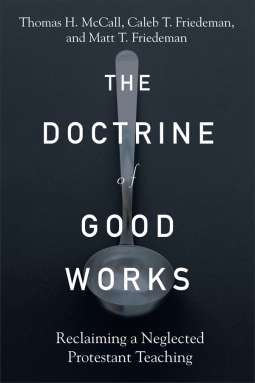
The Doctrine of Good Works
Reclaiming a Neglected Protestant Teaching
by Thomas H. McCall; Caleb T. Friedeman; Matt T. Friedeman
This title was previously available on NetGalley and is now archived.
Send NetGalley books directly to your Kindle or Kindle app
1
To read on a Kindle or Kindle app, please add kindle@netgalley.com as an approved email address to receive files in your Amazon account. Click here for step-by-step instructions.
2
Also find your Kindle email address within your Amazon account, and enter it here.
Pub Date Jul 25 2023 | Archive Date Aug 08 2023
Baker Academic & Brazos Press | Baker Academic
Talking about this book? Use #TheDoctrineofGoodWorks #NetGalley. More hashtag tips!
Description
In Titus, Paul says Christ redeemed a people "zealous for good works." Despite this declaration and others like it, the doctrine of good works has fallen on hard times in contemporary Protestant theology and practice. At best, it's neglected--as in most systematic theologies and in too much church teaching. At worst, it's viewed with suspicion--as a threat to salvation by grace alone through faith alone.
In this important work addressing a significant gap in current theological literature, the authors argue that by jettisoning a doctrine of good works, the contemporary church contradicts historical Protestantism and, more importantly, biblical teaching. They combine their areas of expertise--exegesis, systematic and historical theology, and practical theology--to help readers recover and embrace a positive doctrine of good works. They survey historical Protestant teaching to show the importance of the doctrine to our forebears, engage the scriptural testimony on the role of good works, formulate a theology of salvation and good works, and explore pastoral applications.
Advance Praise
“This book provides a powerful and necessary intervention for an American church addicted to cheap grace. With pastoral insight and care, the authors expose the destructive half-truths and clichés that mislead so many well-meaning Christians. They replace these distortions with the richest insights and practices of the Protestant tradition and the Scriptures that directed it. This is Protestant theology at its very best, because this is theology from and for the church. Every pastor and teacher should read this book.”—Keith L. Johnson, professor of theology, Wheaton College
“Good works are an often neglected or misunderstood scriptural theme. McCall, Friedeman, and Friedeman correct many misconceptions and set forth their own understanding in this important work. They examine the role of good works historically, biblically, theologically, and practically. I am grateful for this contribution and hope it precipitates further conversation and study.”—Thomas Schreiner, James Buchanan Harrison Professor of New Testament Interpretation, The Southern Baptist Theological Seminary
“Unfortunately, in some Protestant circles since the Reformation, good works have undeservedly gotten a bad name. In fact, precisely for saying ‘Faith without works is dead,’ James’s letter was called by Luther ‘a right strawy epistle,’ and he questioned its inclusion in the New Testament. This book takes on numerous caricatures such as ‘Good works have nothing to do with salvation’ in a refreshing and detailed way, and the result is the best single study I know of on this subject. Salvation involves far more than initial justification, and there is a reason why Paul said, ‘Work out your salvation with fear and trembling,’ and yes it involves doing, not just believing or having saving faith. This book itself is a ‘good work.’ And after all, Titus 2:14 reminded us to be ‘zealous for good works.’ I highly recommend this study.”—Ben Witherington III, Jean R. Amos Professor of New Testament for Doctoral Studies, Asbury Theological Seminary
“McCall, Friedeman, and Friedeman offer a gift to the church in this challenge to reclaim good works in the Protestant tradition. With clarity and conviction, they argue that true faith in Christ will necessarily result in good works. Such a conclusion need not lead to legalism but can encourage an empowered and motivated body equipped by the Spirit to love God and love others. Ultimately, this book is a needed corrective to cognition-centered faith that may not actually be faith at all.”—Christa L. McKirland, lecturer in systematic theology, Carey Baptist College; executive director of Logia International
“Saved by good works? Yes! Not only Catholics but also Protestants have traditionally taught this. The Doctrine of Good Works shows how diverse Protestant traditions and thinkers have articulated a positive doctrine of saving good works while prioritizing grace and faith. Far from simply correcting caricatures, McCall, Friedeman, and Friedeman contribute positively to the current theological conversation about how to best systematize what Scripture teaches about salvation. Their results are made practical by inspiring case studies. Highly recommended.”—Matthew W. Bates, professor of theology, Quincy University; author of Salvation by Allegiance Alone
Available Editions
| EDITION | Other Format |
| ISBN | 9781540965202 |
| PRICE | $27.99 (USD) |
| PAGES | 224 |
Available on NetGalley
Average rating from 1 member
Featured Reviews
 Reviewer 1154977
Reviewer 1154977
This book was very challenging for me to read. Im definitely going to need to reread it again in a few months, as I found the material quite academic for my non-seminary background. It was a good start for me to become more familiar with doctrines of grace, salvation and justification. I know I'll need to reread this one to fully appreciate the discussion on works and salvation. I appreciated the examples of ministry in action in the second half of the book.



